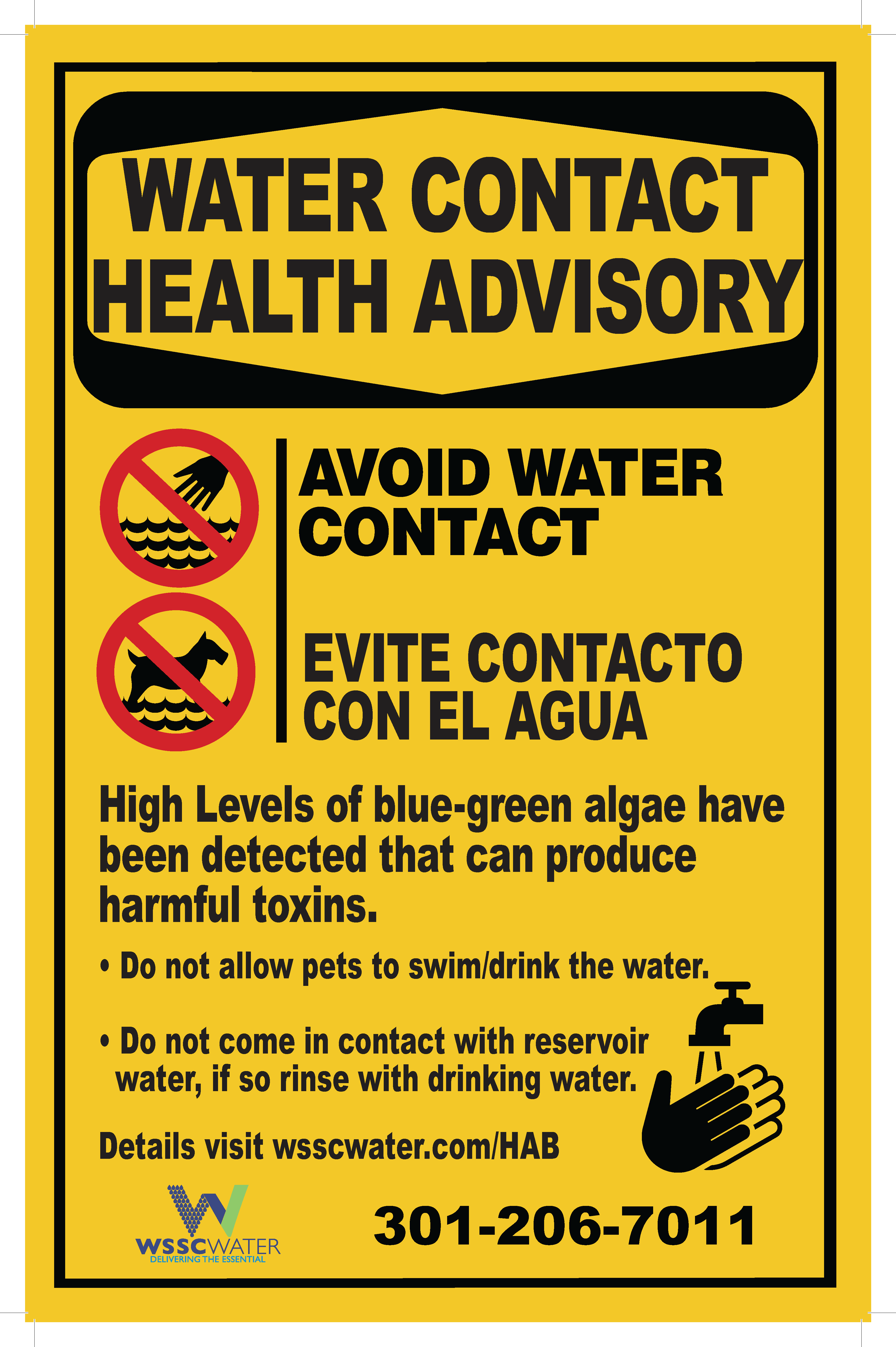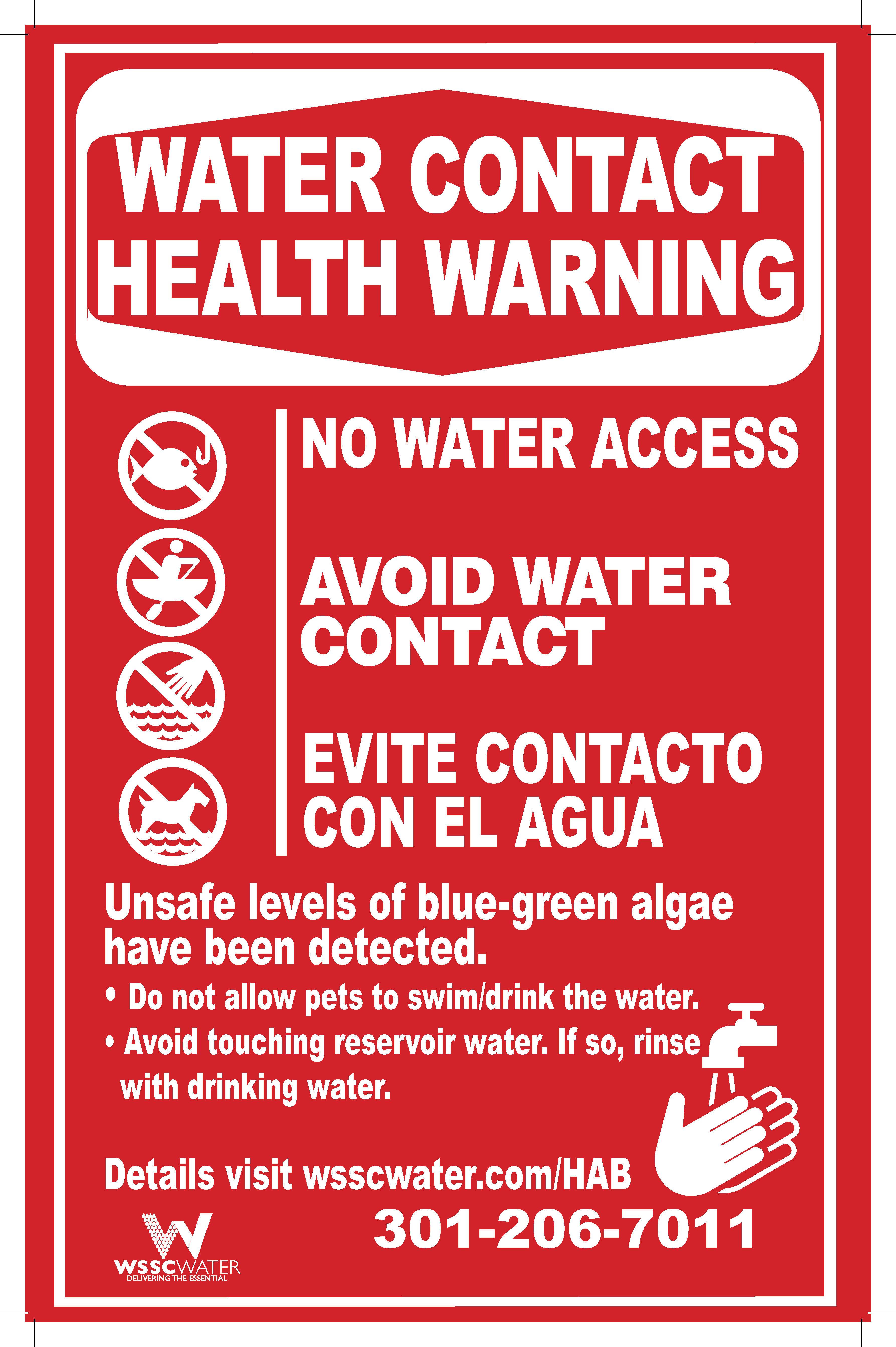Blue-green algae (or cyanobacteria) is a type of naturally occurring bacteria that can be present in water bodies, particularly lakes and reservoirs. These are known as Harmful Algal Blooms (HABs) because some of them can produce harmful chemicals (called cyanotoxins) that cause adverse health effects if ingested or from coming in contact with skin. HABs tend to increase during spring and summer, as the water temperature warms up. WSSC Water closely monitors these algal activities in our Potomac River and Rocky Gorge Reservoir as it is used as a drinking water source for Patuxent Water Filtration Plant (WFP) as well as for recreational purposes.
Additionally, other naturally occurring seasonal algae can give the water an earthy or musty taste and odor. Do not be alarmed, these are not harmful algae. We carefully monitor water temperature, oxygen levels, and HABs levels to watch for such activity.
Cyanotoxins in Drinking Water
WSSC Water monitors both treated and untreated water for cyanotoxins during the warmer months to ensure these toxins do not enter our water system. If we see any increase in algal activity in the source water, we step up this monitoring program and have treatment measures we can employ. While not required by regulatory agencies, we implemented this monitoring program in 2015 as a proactive measure to address growing concern related with HABs, and have not detected any cyanotoxins in the treated tap water.
The U.S. Environmental Protection Agency (U.S. EPA) published national drinking water Health Advisories for the cyanotoxins (see Table 1). The Health Advisories provide the cyanotoxins levels in drinking water that may pose adverse human health impacts when exposed to these levels over a 10-day time period. The Health Advisories are lower for younger children because they consume more water relative to their body weight and thus are at increased risk of adverse health impacts. These Health Advisories are not an enforceable health standards, but a recommended guideline for water utilities to manage the risks if found.
| 10-DAY HEALTH ADVISORIES | LEVEL |
|---|---|
| Microcystins | |
| Children pre-school age and younger (under 6 years old) | 0.3 ug/L |
| 6 years and older | 1.6 ug/L |
| Cylindrospermopsin | |
| Children pre-school age and younger (under 6 years old) | 0.7 ug/L |
| 6 years and older | 3.0 ug/L |
HABs in Recreational Water
We also monitor the health of our reservoirs as they are often used for recreation. Accidentally consuming reservoir water can cause harmful health effects if HABs are present. Signs will be placed around each recreation area when water contact is unsafe. Please adhere to these signs. WSSC Water watershed regulations prohibit pets from being in the water at any time.
People can have adverse health effects from HABs if they:
- Accidentally ingest reservoir water (e.g., splashed onto face)
- Consume tainted fish flesh or internal organs
- Wade in or contact affected waters (e.g., while launching kayaks, canoes or boats)
Some of the adverse health effects can include:
- Skin irritation or rashes
- Nausea or other gastrointestinal distress
- Disorientation
- Numbness
- Fatigue
There are reports that some pets have died from contact with algal toxins. WSSC Water watershed regulations prohibit pets from being in the water.
HABs can also create dead zones in bodies of water, which may kill aquatic life, raise treatment costs for drinking water, and hurt businesses and jobs that depend on clean water.
If high levels of cyanobacteria are detected, WSSC Water increases water-testing efforts to closely monitor the status. Because the reservoirs also serve as drinking water sources, we closely monitor toxin levels at the treatment plant as well.
During a HABs event, if you, someone you know, or a pet has contacted or ingested water at the affected reservoir, you should call your local Health Department listed below.
- Howard County: 410-313-1773 (Environmental Health Department)
- Montgomery County: 240-777-0311 (Montgomery County 311)
- Prince George’s County: 301-883-4748 (Prince George’s County 311)
When HABs occur, WSSC Water will post water contact advisory or warning signs at all affected recreation areas and alerts on the WSSC Water website. This is to limit or prevent recreational water contact until concentrations decrease to an acceptable level. Examples of the signs are below.
 | An advisory means that there are high levels of blue-green algae in areas of the reservoir and water contact may pose negative health effects. During an advisory, water contact is not advised. During a health advisory:
| |
 | A warning means that there are extremely high levels of blue-green algae in areas of the reservoir and water contact is not allowed due to likely negative health effects. The affected reservoir will be closed to recreation during a warning. During a health warning:
|